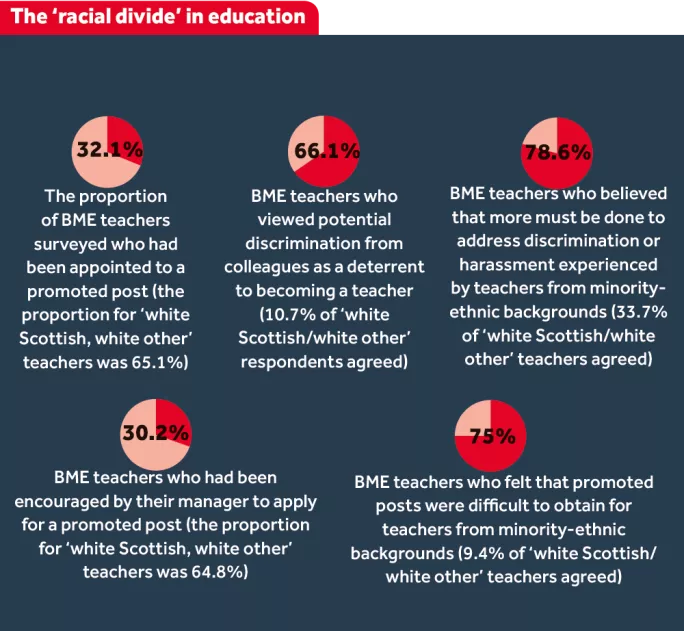‘It’s time to tackle racism in the teaching profession’

Concerns that low numbers of black and minority ethnic teachers in Scottish schools are a sign of unsupportive working environments have been raised before - typically, however, they have been based on anecdote rather than empirical data.
Now research from Scotland’s biggest council has cast new light on ethnic diversity in the teaching profession - with the findings prompting one expert to call for employers to “stop sliding away” from confronting racism and “old pals” networks.
Glasgow City Council researchers surveyed 490 staff across all school sectors and 513 secondary pupils, and also ran focus groups. They found a big divide in how black and minority ethnic (BME) and white teachers viewed ethnic diversity, and the insight gained will now shape efforts to encourage more BME people into teaching across Scotland.
Perhaps most strikingly, “white Scottish/white other” teachers were twice as likely as their BME colleagues to have been appointed to a promoted post, while BME survey respondents were “much less likely” to have been encouraged by their manager to apply for promotion.

The report, Ethnic Diversity in the Teaching Profession: a Glasgow perspective, also reveals a huge divide along ethnic lines in how teachers view the scale of the problems faced by BME teachers. Three-quarters of BME survey participants felt that promoted posts were difficult to obtain for teachers from minority ethnic backgrounds, against less than 10 per cent of white teachers.
And while 66 per cent of BME respondents viewed potential discrimination from colleagues as a deterrent to becoming a teacher, only 11 per cent of white respondents agreed. There were also concerns about discrimination beyond the school gates, with one Pakistani primary teacher in the survey saying the current “political climate was a huge hindrance for Muslim teachers”. The pupil survey, however, also suggests other factors that may be alienating BME people from teaching. None of the BME pupils in a focus group, for example, had considered teaching, and they talked of “higher aspirations”, with their families keen for them to go into science, medicine, computing or business.
And some pupils identified a vicious circle: a dearth of BME teachers resulting in a lack of role models presenting teaching as a “plausible career choice” for BME children.
Tackling the issue
Professor Rowena Arshad, head of the University of Edinburgh’s School of Education, says the Glasgow research will help to shape the findings of a Scottish government short-term working group she is chairing, designed to increase the number of teachers from under-represented groups.
Arshad has previously written about how the proportion of BME teachers surprisingly fell between 2011 and 2016, from 1.9 to 1.3 per cent of the total workforce (“‘If I can’t see myself there, I can’t imagine myself there’”, Tes Scotland, 9 February).
In response to the Glasgow survey, Arshad says: “It is time that employers and those that provide preparation for school leaders tackle the issue of racism within the profession, corridors, classrooms and staffrooms.
“Stop sliding away from confronting the issue - hiding behind phrases like ‘unconscious bias’ or just talking about inclusion. Perhaps the ‘face fits’ and ‘old pals’ issue still exists?”
Glasgow City Council education director Maureen McKenna says the authority is already considering several courses of action prompted by the research, including “more qualitative work with pupils who want to enter teaching as a profession and galvanising the support of current BME teachers to help spearhead a push to communities to highlight the benefits of teaching as a career of choice”. “We also need to consider nationally the issue of recruitment, selection and promotion of BME teachers,” she adds.
“We started this research over a year ago because we recognised that our workforce did not reflect the communities we serve. I am pleased that we are able to use it to influence practice not just in Glasgow, but also nationally, as I am part of the national working group,” says McKenna.
Professor Ian Rivers, head of the University of Strathclyde school of education, says the Glasgow research will be used in fresh efforts to make its student teacher population more representative of Scottish society.
This process, which has just started, will not only encompass BME communities but also other groups who may not have enough representation in teaching, such as LGBT people, and will address the lack of men in primary schools. Rivers explains that this could involve targeted recruitment campaigns, perhaps at cultural or music festivals, or small changes such as staff using email signatures to state their preferred pronouns, a move backed by transgender groups.
He also hopes that the availability of new undergraduate and postgraduate routes into teaching will “encourage students from diverse backgrounds on to our courses”.
Education secretary John Swinney says: “We want BME groups to be better represented in teaching and have engaged with a number of charities, local authorities, ITE [initial teacher education] providers and other groups to get their views on how to make that happen.”
He adds that, while “teacher recruitment is a matter for local authorities, we want to encourage action to address this issue”, and that the group chaired by Professor Arshad will make recommendations “in the coming months”.
You need a Tes subscription to read this article
Subscribe now to read this article and get other subscriber-only content:
- Unlimited access to all Tes magazine content
- Exclusive subscriber-only stories
- Award-winning email newsletters
Already a subscriber? Log in
You need a subscription to read this article
Subscribe now to read this article and get other subscriber-only content, including:
- Unlimited access to all Tes magazine content
- Exclusive subscriber-only stories
- Award-winning email newsletters